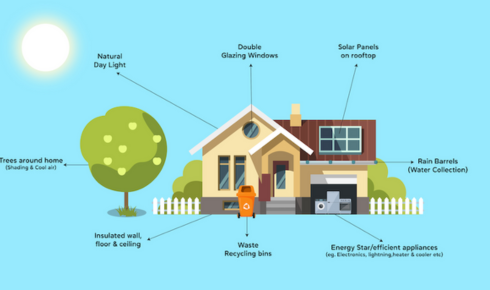Table of Contents:
- Why Energy Efficiency Matters in Every Home
- Quick Energy Wins for Every Season
- Maintaining Your HVAC for Peak Performance
- Choosing Efficient Appliances: What to Look For
- Should You Get a Professional Energy Audit?
Why Energy Efficiency Matters in Every Home
Enhanced energy efficiency isn’t just about saving a few dollars on utility bills—it brings a cascade of positives to every home. A more efficient house leads to a healthier, more comfortable living environment and benefits the planet. With residential energy use accounting for nearly 21% of total U.S. energy consumption, every homeowner plays a unique role in fostering broader sustainability. According to the U.S. Department of Energy, about 30% of home energy can be lost to inefficiencies, ranging from leaky ductwork to single-pane windows and aged insulation. These aren’t just minor leaks—they represent real money and resources that quite literally slip through the cracks. For instance, large-scale upgrades such as new heating or cooling equipment may require guidance from seasoned specialists with a track record in HVAC systems installations Baltimore, MD. Regardless of your starting point, every improvement—big or small—can be felt in comfort, cost, and environmental impact. Consistently reducing energy loss will help keep your home cooler in summer, warmer in winter, and friendlier to your future budget.
Quick Energy Wins for Every Season
Jumping into efficiency doesn’t mean you must spend a fortune or wait until a renovation. Some of the most effective changes are simple behavioral adjustments or minor investments. Using draft stoppers at exterior doors during cold months helps prevent heat from sneaking out, while heavy curtains keep out the chill. In warmer seasons, closing blinds and drapes on hot afternoons reduces the strain on your cooling system, and strategic use of fans allows you to feel several degrees cooler without touching the thermostat.
- Upgrade high-use light fixtures to LED bulbs, which last longer and consume less electricity
- Unplug electronics and chargers when they’re not in use to reduce “phantom” electricity draw
- Wash clothes in cold water and line-dry when possible to cut down on water heating costs
- Set thermostats to recommended energy-saving temperatures, especially when you’re not home
- Make sure vents and registers are unblocked for the best possible airflow throughout the house
These everyday actions may seem small, but they add to real savings. Replacing only five of your most-used lighting fixtures or bulbs with ENERGY STAR-rated LEDs can amount to roughly $75 in annual savings, and most LED bulbs last a decade or more. That’s a solid return for a quick afternoon project.
Maintaining Your HVAC for Peak Performance
The backbone of any home comfort system—heating, ventilation, and air conditioning—deserves regular attention. Like any high-performance machine, your HVAC will naturally lose efficiency due to normal wear, dust, and buildup. Replacing or cleaning filters every one to three months is a low-cost way to keep your system breathing easily. Some experts advise checking monthly, particularly if you have pets or allergies, as hair and dust accumulate faster than many expect.
- Routinely check and replace filters based on the manufacturer’s instructions
- Keep a clear space around outdoor condenser units to ensure adequate airflow
- Have a professional inspect and, if necessary, seal ductwork to minimize energy loss
- Test your thermostat accuracy at the start of each major heating or cooling season
These preventive tasks help reduce system wear, extend equipment lifespan, and avoid costly mid-season breakdowns. Regular maintenance doesn’t just keep the heat or air conditioning running; it ensures every dollar you spend is actually going into comfort, not wasted energy.
Choosing Efficient Appliances: What to Look For
Even if your HVAC and insulation are up to snuff, outdated appliances can quietly sap away savings. Refrigerators, dishwashers, washing machines, and dryers are big energy users, especially if they’re over a decade old. Replacing them with ENERGY STAR-certified options ensures you get models that use anywhere from 10% to 50% less energy than non-rated counterparts.
- When possible, prioritize replacing old refrigerators and clothes washers, as they run often and use the most energy
- Select the right size appliance for your actual needs—a larger model isn’t always more efficient
- Look for appliances with “eco” modes or programmable timers to run cycles at non-peak hours
- Smart appliances can add further efficiency by optimizing settings based on real-time data
While upfront costs may seem daunting, federal rebates and utility incentives can lower your investment. Plus, the ongoing reduction in energy bills helps recoup expenses quickly, year after year.
Should You Get a Professional Energy Audit?
A professional energy audit delivers targeted guidance if you’ve tackled the basics and are looking for a customized plan to boost efficiency even further. These assessments include a room-by-room review, blower-door tests to measure air leakage, infrared cameras to see where insulation is lacking, and specific advice on prioritized improvements.
Many families discover quick wins—like a forgotten drafty attic hatch, a misprogrammed water heater, or uninsulated pipes in the basement—that make a meaningful difference without major expense. The audit report typically outlines cost, savings, and payback time for each suggestion, so homeowners can make informed decisions about where to invest their resources for the most effective results.
Improving your home’s energy efficiency is an ongoing adventure, but even a handful of focused changes can make daily life more comfortable and less expensive. The goal is progress, not perfection—every step helps pave the way to a more sustainable, future-forward home.

